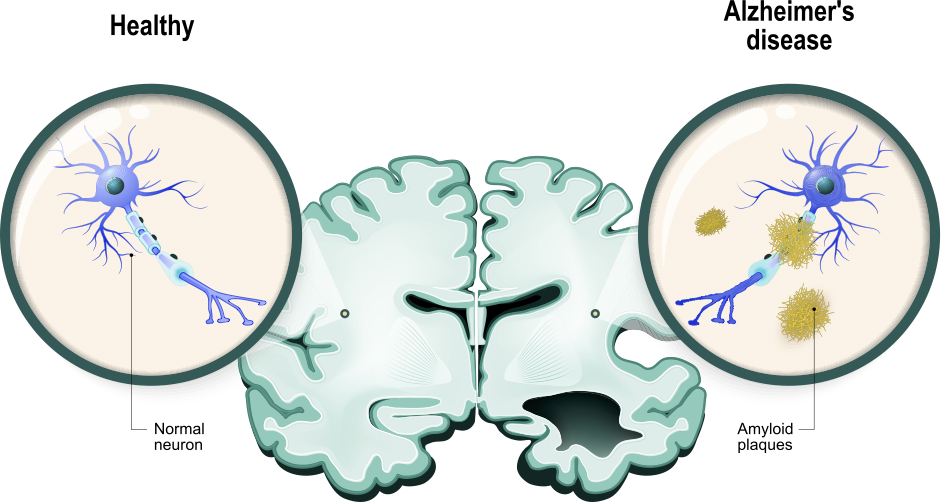Alzheimer’s Disease
What is Alzheimer’s disease?
Alzheimer’s disease is a progressive neurological disorder that affects the brain and is the most common cause of dementia. It is named after Dr. Alois Alzheimer, who first identified and described the condition in 1906.
Alzheimer’s disease gradually impairs cognitive functions, including memory, thinking, and behavior. It is characterized by the accumulation of two abnormal structures in the brain: beta-amyloid plaques and neurofibrillary tangles. These structures interfere with the normal functioning of brain cells and disrupt communication between them, leading to the symptoms of Alzheimer’s.
The exact cause of Alzheimer’s disease is not yet fully understood, but age is the greatest risk factor. Other factors that may contribute to the development of the disease include genetics, family history, certain genetic mutations, and lifestyle factors such as cardiovascular health, physical activity, and diet.

Symptoms of Alzheimer’s disease
The symptoms of Alzheimer’s disease progress over time and typically include:
- Memory loss: Individuals may have difficulty remembering recently learned information, as well as important dates or events.
- Cognitive decline: People with Alzheimer’s may experience difficulty with thinking, problem-solving, language, and judgment.
- Behavioral changes: This may include depression, apathy, social withdrawal, mood swings, and changes in personality.
- Disorientation: Individuals may become disoriented in time and space, getting lost in familiar places.
- Decline in self-care: As the disease progresses, individuals may struggle with basic tasks such as dressing, bathing, and feeding themselves.
How Common is Alzheimers Disease?
The prevalence of Alzheimer’s disease varies depending on the population and the age group being considered. According to estimates from the World Health Organization (WHO), globally, around 50 million people have dementia, with Alzheimer’s disease accounting for 60-70% of those cases.
To provide a broader perspective, here are a few statistics on the prevalence of Alzheimer’s disease:
- United States: In the United States, it is estimated that around 6.2 million individuals aged 65 and older have Alzheimer’s disease. This number is expected to rise to nearly 13 million by 2050, due to the aging population.
- Global estimates: The number of people living with Alzheimer’s disease worldwide is projected to reach 82 million by 2030 and 152 million by 2050, assuming no medical breakthroughs to prevent or cure the disease.
- Age-related risk: The risk of developing Alzheimer’s disease increases with age. It is relatively rare in people under 65, but the prevalence rises significantly as individuals get older. Beyond the age of 65, the risk doubles approximately every five years.
It’s important to note that these figures are estimates, and the actual prevalence may vary due to factors such as underdiagnosis, differences in diagnostic criteria, and variations in data collection methodologies across different countries and studies.
How is Alzheimer’s disease diagnosed?
The diagnosis of Alzheimer’s disease involves a comprehensive evaluation that includes medical history assessment, physical examination, cognitive and neurological testing, and sometimes imaging and laboratory tests. Here are the key steps and methods used in diagnosing Alzheimer’s disease:
- Medical history and assessment: The doctor will gather information about the individual’s symptoms, their onset, progression, and any family history of dementia or Alzheimer’s disease. They may also inquire about the presence of other medical conditions that could contribute to cognitive decline.
- Cognitive and neurological testing: Various tests are conducted to assess memory, thinking, language, attention, and problem-solving skills. These tests can help identify cognitive impairments and determine the severity. They may include the Mini-Mental State Examination (MMSE) or other similar cognitive assessment tools.
- Functional assessment: The doctor will evaluate the individual’s ability to perform daily activities and self-care tasks. This assessment helps determine the impact of cognitive decline on their daily life and functioning.
- Imaging tests: Brain imaging techniques, such as magnetic resonance imaging (MRI) or positron emission tomography (PET), may be used to rule out other causes of cognitive impairment, visualize changes in brain structure or detect the presence of amyloid plaques and neurofibrillary tangles associated with Alzheimer’s disease.
- Laboratory tests: Blood tests may be conducted to rule out other medical conditions that can cause similar symptoms, such as thyroid problems, vitamin deficiencies, or infections.
- Neuropsychological testing: In some cases, more detailed neuropsychological assessments may be performed to evaluate specific cognitive domains and provide a comprehensive profile of cognitive strengths and weaknesses.
It’s important to note that a definitive diagnosis of Alzheimer’s disease can only be made with certainty through a brain autopsy after death. However, the diagnostic process aims to identify the most likely cause of the individual’s symptoms based on clinical evaluation and tests.
Treatment
While there is currently no cure for Alzheimer’s disease, there are treatment options available that can help manage symptoms, slow down the progression of the disease, and improve the quality of life for individuals with Alzheimer’s. The treatment approach for Alzheimer’s disease typically involves a combination of the following:
- Medications: Several medications are approved for the treatment of Alzheimer’s disease. These medications work by regulating neurotransmitters in the brain and can help improve cognitive function, manage behavioral symptoms, and slow down the progression of the disease. Commonly prescribed medications include cholinesterase inhibitors (such as donepezil, rivastigmine, and galantamine) and memantine, which is an N-methyl-D-aspartate (NMDA) receptor antagonist.
- Supportive care: Alongside medication, supportive care plays a crucial role in managing Alzheimer’s disease. This includes creating a structured and supportive environment, establishing routines, providing cognitive stimulation activities, and offering emotional support to both the individual with Alzheimer’s and their caregivers.
- Lifestyle interventions: Certain lifestyle factors can influence the prevention and progression of Alzheimer’s disease. Encouraging regular physical exercise, maintaining a healthy diet (such as the Mediterranean diet), promoting social engagement, and ensuring adequate sleep can all contribute to overall well-being and potentially slow down cognitive decline.
- Cognitive interventions: Cognitive stimulation therapy, cognitive rehabilitation, and other forms of cognitive training can be beneficial in managing symptoms and improving cognitive function. These interventions involve structured activities and exercises that aim to enhance memory, thinking, and problem-solving skills.
- Behavioral and psychological interventions: Managing behavioral and psychological symptoms of Alzheimer’s disease (such as agitation, aggression, depression, and sleep disturbances) is important for the well-being of individuals with the condition. Non-pharmacological interventions, such as behavioral therapy, music therapy, art therapy, and reminiscence therapy, can help address these symptoms.
It’s essential for individuals with Alzheimer’s disease and their caregivers to work closely with healthcare professionals to determine the most appropriate treatment plan based on the individual’s specific needs and stage of the disease. Regular monitoring and follow-up evaluations are necessary to assess the effectiveness of treatments and make any necessary adjustments.
Limitless success starts here
“The key is this: Meet today's problems with today's strength. Don't start tackling tomorrow's problems until tomorrow. You do not have tomorrow's strength yet. You simply have enough for today.” -Max Lucado Optimism is the belief that the future will be better than...
Grit
This week, I spent time with a friend who is currently caring for her husband of 30 years and her son, who both have late-stage cancer. I am praying for their healing, but the reality is, it isn’t looking good. And, She is no more or less content today than she has...
We have “hope” all wrong……
“Hope” is a virtue that can be a good foundation to propel us forward. In fact, I think it is essential for living life in a “broken” world. Yes, the world is broken. Humans are fallible. And because of this, bad things happen to good people. Evil does not...
Ensure Indoor Air Quality With the Best Air Purifiers of 2023
Based on information from the Environmental Protection Agency, most Americans spend 90% of their time indoors. Unfortunately, the amount of pollutants inside is often up to five times higher than most outdoor areas. Though it’s a worrying statistic, air purifiers can...
Decluttering: The Life-Changing Benefits of Tidying Up
One in 11 Americans have so many belongings that they have to pay a sweet $91.14 per month (on average) for storage space outside their homes. It’s not necessarily hoarding—sometimes, they just have difficulty parting with their prized possessions because of the...
Air Purifiers: Impact on health and disease
Our “environment” is one of many ways that it is possible to “leverage” health outcomes. In other words, decrease inflammation (correlated with many diseases) and optimize cell function. “Environmental air pollution has a direct impact on human health, being...
Failure…..
“Like success, failure is many things to many people. With positive mental attitude, failure is a learning experience, a rung on the ladder, and a plateau at which to get your thoughts in order to prepare to try again.”W. Clement Stone I have met many people that have...
It’s True! Having a Sense of Agency Over One’s Health Can Increase Our Lifespan
Our resilience and it turns out—even our longevity—depends on having a sense of agency over one’s health. When we talk about a sense of agency, we’re referring to having a feeling of control over what happens to us. It’s important because it aids our mental stability,...






